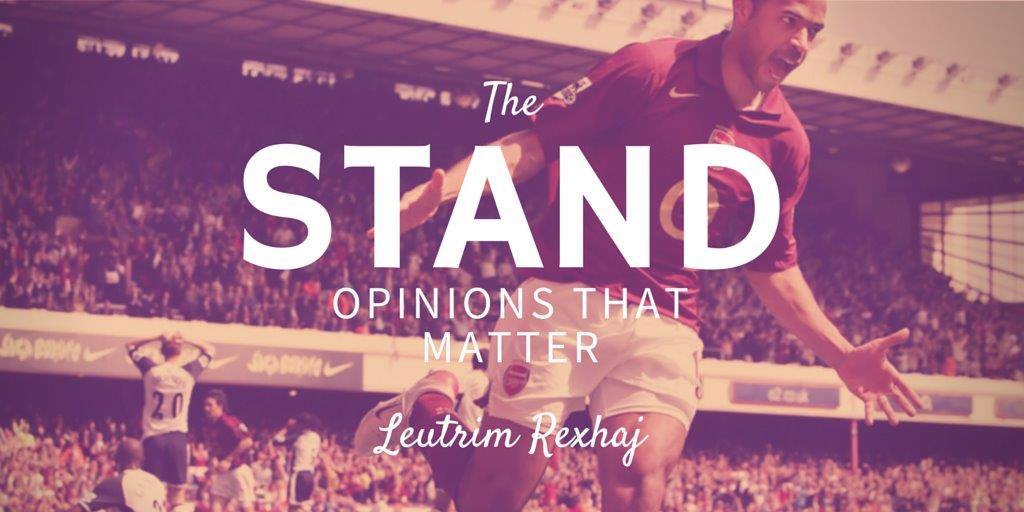The season is young, the weather is still warm and the transfer window hangs like a stormy cloud over most clubs’ affairs, but Arsenal are about to face their first big challenge of the season when they entertain Liverpool at the Emirates on Monday night.
While Arsenal and Liverpool are no longer consistently rivalling one another for the title like they did in the late 80s and early 90s, this fixture still represents a clash between two of England’s traditional powerhouses.
And while Liverpool have been able to nab 2nd place finishes as recently as 2014 and 2009 (a feat Arsenal have failed to replicate since 2005), it should go without saying it’s the Gunners whose fortunes are looking considerably rosier heading into the third game of the campaign.
Liverpool, having just come within inches of winning their first title since before I was born (guess my age), have seen their squad lose an icon (Steven Gerrard), their talisman (Luis Suarez), England’s next best hope (Raheem Sterling) and the career of their best remaining player (Daniel Sturridge) has stalled due to injuries. Does that sound familiar to you?
Similar?
Arsenal went through similar squad upheaval between 2005 (when Patrick Vieira departed for Juventus and Dennis Bergkamp retired*) and 2012 (when Robin van Persie and the little boy inside him went to Manchester United and Alex Song became Barcelona’s albatross). Seven years, seven summers of seeing historic figures like Thierry Henry and world-class youngsters like Cesc Fabregas join clubs that, at the time, were on an upwards trajectory Arsenal could not match.
*[Editor’s note: Remember, Bergkamp retired in 2006, but the point still stands.]

It was a sad existence for a club that had just enjoyed three titles in eight years and five runners-up finishes. Indeed, the memory of the Invincibles was still fresh in the memory of many an Arsenal fan’s mind, but the unbridled joy of ultimate victory felt centuries in behind us.
And while the pain is still well and alive until a title is secured, many fans such as myself are reasonably happy with how Arsene Wenger, Ivan Gazidis and Dick Law (if he even exists) negotiated that tumultuous period and steered us back towards competitiveness and prosperity. The same cannot be said of this Liverpool squad.
Dissimilar
Because while they continue to spend money like it’s going out of fashion, and they indeed have some class players in their ranks, it seems to me the gap between them and the top four will only grow, not close.
Not financially, of course, the Premier League as a whole will only get richer with each television deal and Liverpool retain one of the world’s largest and most dedicated fan bases. No, rather I look at Liverpool’s transfer strategy over the past seven years or so and see prolific wastefulness.

Much has been said of how Liverpool have adopted a committee approach to transfers, but instead of choosing one plan and sticking to it, they’ve tried to hedge their bets by buying players all over the map. It’s truly mind-boggling that any club would buy Lazar Markovic, Mario Balotelli, Adam Lallana and Rickie Lambert in the same summer. It’s almost as if each committee member was allowed to make a signing without any consideration for what anyone else did.
That’s an organisational problem, not an economic one. So as long as Liverpool persist with this haphazard, half-assed attempt at a committee pertaining to a transfer committee savvy to analytics AND appeasing the widely-criticised Brendan Rodgers they will almost certainly fail to break back into the top four.
Hailed as a tactical genius during that near-title-winning campaign, his reputation fell apart last season as he failed to get Liverpool out of their Champions League group and sunk to 6th in the table. While all the blame can’t be put on Rodgers, his inability to cope without his superstar is a testament to how difficult Wenger’s job was for seven years. (For the record, I think Liverpool rightly kept the Northern Irishman.)
But there’s no sign of Liverpool changing. They brought in Christian Benteke (for £32m), a player who scores a disproportionate number of goals off of crosses, but will pair him with the likes of Sturridge, Danny Ings (good move), Roberto Firmino (good move) and Philippe Coutinho. The only problem is that none of those players cross the ball much. Liverpool were actually one of the least prolific crossers of the ball last season. This is further evidence of a disconnect between management, scouting and the committee.

Same page
Arsenal, for better or worse, never really had this problem. Wenger and the Arsenal board were always on the same page. They needed to finance the stadium, and that meant it was time to be frugal. Buy low, sell high, repeat was the motto. And it worked.
Gazidis said in order for him to keep his job, Wenger would have to secure Champions League football every other year. Wenger hasn’t missed the Champions League in 18 years now.
Now, this article isn’t meant to convince you Wenger is a better manager than Rodgers, but rather to illustrate that long term planning and cohesion at a managerial and executive level is necessary when taking on such a lofty challenge. In order for Liverpool to succeed, they will have to take a good, long look at how Arsenal sustained their position before they can hope to break through an increasingly impenetrable ceiling.
Let’s face it, the Premier League is a better league with greater competitive balance. Predictability is boring, and here’s hoping Liverpool can reverse this sad trend of missing the Champions League in six of the past seven years…especially if its at Chelsea’s or United’s expense.
Monday’s tilt is ultimately only a matter of three points, but a poor performance could see Liverpool’s slim top four chances become even narrower.

